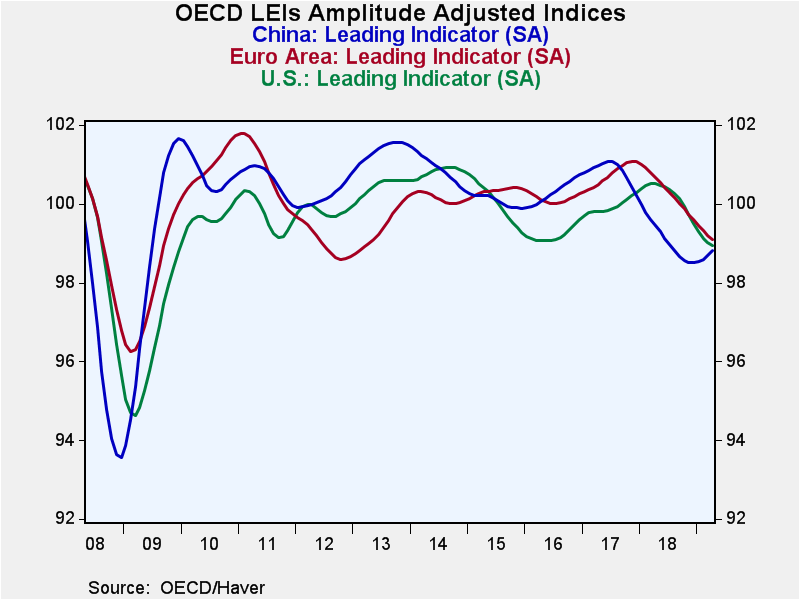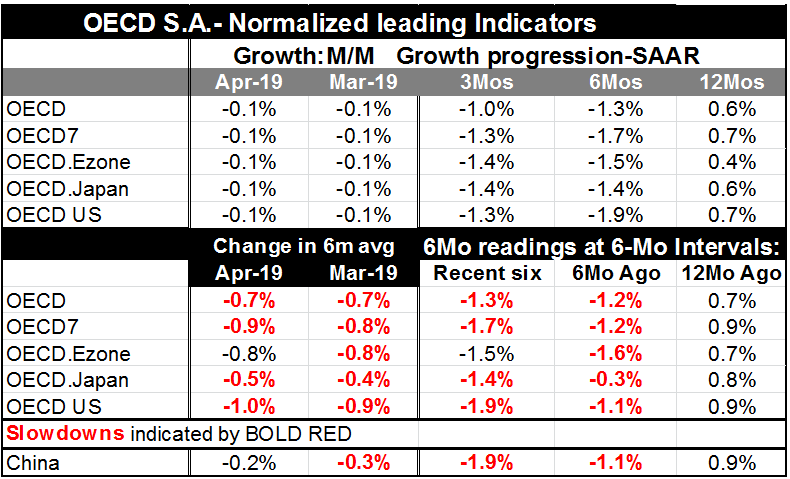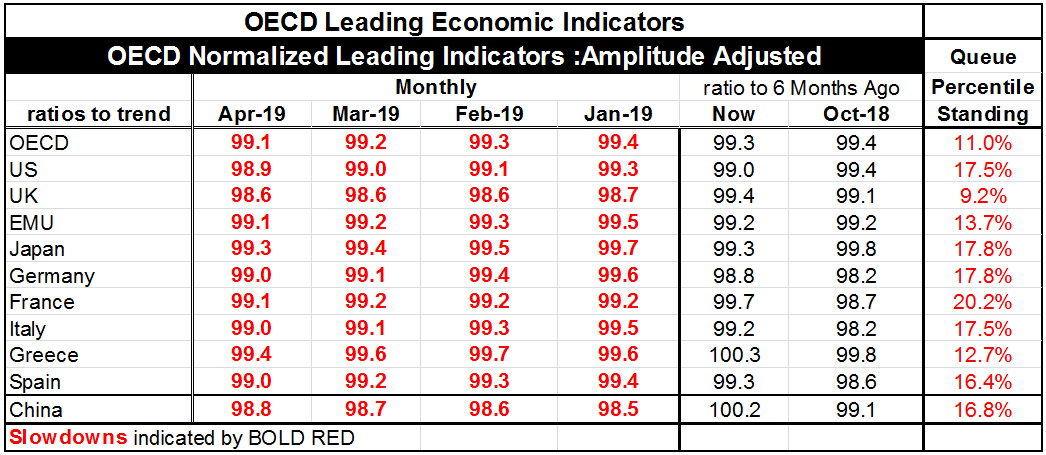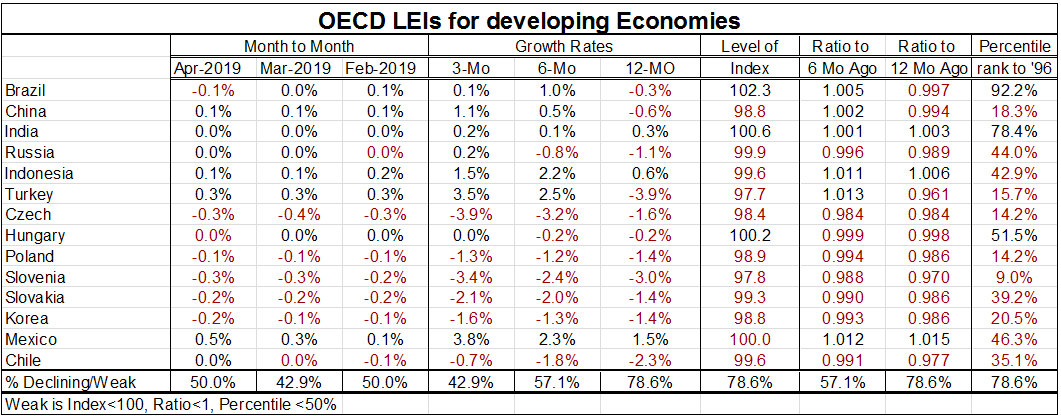 Global| Jun 11 2019
Global| Jun 11 2019OECD LEIS Show Further Weakening
Summary
OECD LEIS Show Further Weakening. The Peril of Trade War Meets the Peril of No Trade War OECD LEIS weakened again this month and they continue to point to a broad slowdown. The OECD leading indicators decline on all broad categories [...]
The Peril of Trade War Meets the Peril of No Trade War
 OECD LEIS Show Further Weakening.
The Peril of Trade War Meets the Peril of No Trade War
OECD LEIS weakened again this month and they continue to point to a broad slowdown. The OECD leading indicators decline on all broad categories in the top panel of the table: in April, in May over 3-months and over 6-months. They are all still rising on balance over 12-months.
OECD LEIS Show Further Weakening.
The Peril of Trade War Meets the Peril of No Trade War
OECD LEIS weakened again this month and they continue to point to a broad slowdown. The OECD leading indicators decline on all broad categories in the top panel of the table: in April, in May over 3-months and over 6-months. They are all still rising on balance over 12-months.
The bottom panel looks at the leading indicators in the way that the OECD prefers, over 6-month intervals. For April and May we present the six month percent change in the 6-month average for both April and May. All of these values are negative and all show further deceleration in April compared to March except for The Euro-Area and China. To the right a series of columns present sequential growth rates arrayed over non-overlapping six month periods. These are simply annualized percentage changes over these periods not taken from averages. They show widespread declines and decelerations over 3-months and 6-months. The 6-month changes from the year-ago period still indicate expansion. But China and the US are in a dead heat as far as the OECD negative readings and deceleration signals are concerned.

The table below looks at the situation for developing economies. The data unambiguously show more countries weak or weakening that stable, strong or improving. However, the situation of the developing economies is far from clear cut. While there is a lot of concern about them and what might happen if the US and other countries start cutting rates, it is the LARGEST developing economies that are still the strongest.

Over the last six months eight of 14 developing economics in the table show their LEI gauges have weakened, a clear majority show weakening. But who is weakening and who is strengthening? The answer is that Brazil, China, India, Indonesia, Turkey and Mexico are strengthening. Russia is the only BRIC nation not showing expansion. So the larger developing economies to this point are not faring so badly at least cyclically. However, only Brazil, China, and Hungary have LEI values indicting that growth will proceed at a pace above its long run value.
The developing economics show more widespread weakness over 12-months or even 12-months ago, than in recent months. That will bear watching because often the policies of the largest economies affect the developing economies but with a lag. I would not be prepared to argue that the developing economies are doing well enough that they could weather a storm of bad events among the more developed economies. I think all we can conclude for now is that the developing economics are hanging in there and that the global malaise and trade war threat has not sucked them into a bad cycle of events.

Maybe not a small world- but an interconnected one OECD data remind us that the world is an interdependent place and that countries are interconnected. A trade war in this era of global production, consumption and complex supply chains will hurt everyone. But to me this is not a reason for the US to stop its pressure for freer trade or its effort to end cheating. The US has been victimized, and has allowed itself to be victimized, by shoddy research and analysis about "free trade". This has led to hollowing out of US industry that in the long run will not be good for anyone. Free trade and Free Trade rules are important to establish (notice I did NOT say reestablish...) because if done properly the system has automatic safeguards that cause the system to roll with the punches of change and to create the changes in currency values in particular that can and will keep the forces at bay that otherwise would consolidate and create trade wars – real ones. The US –China trade war exits because China and others have gamed the trading system and someone in the US finally put his foot down.
It is no more dangerous to put a foot down to stop this sort of thing than it is to let it go unattended gathering momentum until a worse backlash erupts.
The persistent forces undermining free trade Governments naturally want to stick up for local interests and politicians get support (Money!) from local business. In our money-hungry political system, there is always a demand for campaign financing. China, on the other hand, is a communist country so its pressures are different but no less intense or pervasive. When government bureaucracies in either a communist or capitalist economy start doling out subsidies and put up barriers of various sorts to other nations' products, you can be sure that foreigners will be doing the same in no time. Except in the US this strange view emerged that if other countries "cheated" and we did not, half a glass of "free trade" was better than none. That was an extremely stupid idea. And we have paid a price for it. However, uncomfortable this current "trade-war" situation is, at the very least it has opened people's eyes to what has really been going on. It may lead to better freer trade. And even if the US and China remain locked with tariffs in place I would judge that a better condition that the way things were before with China eating our lunch every day and US industry in a state of atrophy. Tariffs raise import prices. But the sooner that the US sees a need to attract manufacturing back to the US and to shift consumer spending away from foreign sources and the sooner that the US gets a grip on its massive never-ending trade deficit, the better.
What does "better-off" mean? Economists tend to measure welfare improvements by "more". There are a lot of complicated things that economists study, weigh and balance, to determine a nation's ‘welfare.' In the end the most reasonable rules have proved to be unusable and economists have basically adopted the simple rule that "more" is "better". Yeah, I know, they give a PhD for this, right? If economic change hurts some and helps others as long as here is more so that the losers can be compensated that state of "more" is considered superior. However, the successful Asian economies don't look at things quite that way. They want to stimulate production and let consumption follow. They are thriftier. Their people save for their future. Americans have not. Americans are focused on more consumption now whether it is sustainable or not. They have been caught in the lurch in a changeover from a defined pension benefit system to a 401-K (good-luck-with-that) system and still have not figured out how behind the eight ball they are. Meanwhile, the outsourcing of jobs and loss of industry has left too many dead-end low-pay jobs and have young people crying foul and looking for a way to force ‘the system' to cough up a better standard of living for them. Ironically THE STATE that has failed them so badly by misidentifying ‘Free Trade' is now looked upon as their potential savior. Young people do not seem to realize that technology and trade have been their undoing and it is free trade that could put them back on the right path. Having more government and more government interference in markets is the wrong way to go. Your government will serve someone but in most instances that someone will not be YOU. Markets serve no one and that is why they are preferred.
The false illusions Democrats and Republicans are the pariahs of the day as each want to convince you that they know best and that the other party is wrong. Democrats are the party of class warfare. Republicans have become the party of deregulation and tax cuts to the chagrin of the budget. But class warfare will not improve things. It is not "rich people" that are keeping you down. Technology has made your job obsolete. Unfree trade has given your job to people abroad who will work for a pittance and never buy anything from you. Fair trade offers answers. Class warfare does not. Working class people have been made worse off because so many of the good jobs have been lost to other nations. Democrat and Republican administrations were at fault.
How to think about the future The easiest way to think about this is to think of the environment, because economics works much the same way. If America were to adopt Green rules and others don't, how will that affect the globe, the overall environment? (Yes I know that Trump opted out of the Paris Accord- this point is not about specifics). In fact the world did agree to crack down on fluorocarbons because of the ozone impact, but there has been a new huge plume of it emanating from...China! Surprise! So what do we make of that? Tip O'Neil once said that all politics is local. I don't dispute him but in this crazy new interdependent world all solutions will be global.
There are a lot of political candidates running around proclaiming all sorts of things to people. Well I have news for you. Economics is not about the fairness of distribution. Capitalism is a meritocracy. And what will make you freest fastest is a more competitive America. Because it will offer better jobs faster and with more staying power. A rules intensive, redistributing incentive destroying America will feel better to the few who first receive largesse under the system. Then the economy will progress to feel and to be much worse. America is a capitalist country. But capitalism has to be allowed work and it has to be defended. It can be manipulated by large firms or commandeered by political parties and when that happens capitalism fails as it is failing now. Sometimes the best economic policy comes from the person you like the least. Remember that being president is not a popularity contest. It's about getting the right things done.
When the promise of a chicken in every pot no longer works beware. Karl Marx said religion is the opiate of the masses. But today see widespread legalization of marijuana and a real opiate crisis and it seems that drugs and opiates have become the opiate of the masses. Dropping out is no solution either.
Robert Brusca
AuthorMore in Author Profile »Robert A. Brusca is Chief Economist of Fact and Opinion Economics, a consulting firm he founded in Manhattan. He has been an economist on Wall Street for over 25 years. He has visited central banking and large institutional clients in over 30 countries in his career as an economist. Mr. Brusca was a Divisional Research Chief at the Federal Reserve Bank of NY (Chief of the International Financial markets Division), a Fed Watcher at Irving Trust and Chief Economist at Nikko Securities International. He is widely quoted and appears in various media. Mr. Brusca holds an MA and Ph.D. in economics from Michigan State University and a BA in Economics from the University of Michigan. His research pursues his strong interests in non aligned policy economics as well as international economics. FAO Economics’ research targets investors to assist them in making better investment decisions in stocks, bonds and in a variety of international assets. The company does not manage money and has no conflicts in giving economic advice.
More Economy in Brief
 Global| Feb 05 2026
Global| Feb 05 2026Charts of the Week: Balanced Policy, Resilient Data and AI Narratives
by:Andrew Cates






